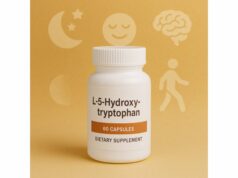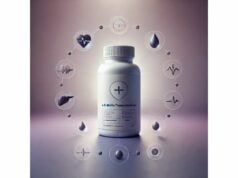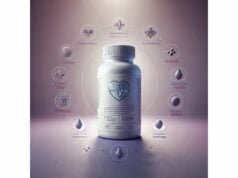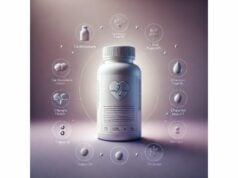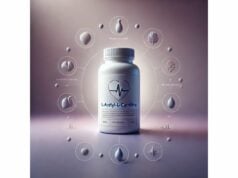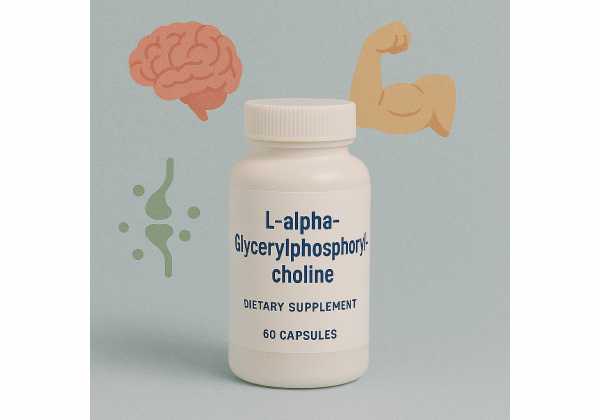
L-alpha-Glycerylphosphorylcholine (often shortened to alpha-GPC) is a choline-containing compound naturally present in small amounts in the brain and in certain foods. As a supplemental ingredient, it is valued for delivering choline efficiently to support acetylcholine production—the neurotransmitter tied to attention, memory formation, and neuromuscular function. Beyond cognition, alpha-GPC appears to influence dopamine and other monoamines, which may explain reports of improved motivation and mood in some studies. Athletes and active adults use it for focus and, anecdotally, for power output; clinicians in some countries have used prescription-grade choline alfoscerate formulations alongside standard care in cognitive disorders. Yet alpha-GPC is not risk-free. Observational data link long-term use to higher stroke risk, and gastrointestinal side effects are not uncommon. This guide takes a clear, evidence-first look at how alpha-GPC works, when it helps, how to dose it, what to combine or avoid, and who should steer clear—so you can decide if it fits your goals and health profile.
Key Insights
- Supports acetylcholine synthesis for memory, attention, and neuromuscular signaling.
- Small human trials suggest benefits for motivation and cognitive symptoms in select groups.
- Typical supplemental range: 300–600 mg per day; clinical protocols sometimes use 1,200 mg per day in divided doses.
- Safety caveat: long-term use has been associated with higher 10-year stroke risk in one large cohort.
- Avoid if pregnant or breastfeeding, with active cardiovascular or cerebrovascular disease, or when using strong cholinergic or anticholinergic drugs unless supervised.
Table of Contents
- What is alpha-GPC and how it works
- Benefits: what the evidence shows
- How to take it: dosage and timing
- What changes your response
- Safety, side effects, and who should avoid
- Research at a glance
What is alpha-GPC and how it works
Alpha-GPC is a water-soluble phospholipid derivative that carries choline—the essential nutrient used to synthesize acetylcholine and phosphatidylcholine. After oral ingestion, alpha-GPC is absorbed and hydrolyzed to free choline and glycerophosphate. Choline then crosses the blood–brain barrier via specific transporters and enters cholinergic neurons, where it combines with acetyl-CoA through choline acetyltransferase to form acetylcholine. Because acetylcholine drives synaptic plasticity in the hippocampus and attention networks and also serves as the neurotransmitter at neuromuscular junctions, adequate choline availability is crucial for both cognition and motor control.
Alpha-GPC is distinct from other choline donors in two ways. First, it is relatively bioavailable; users often report fewer gastrointestinal issues compared to some salts. Second, the glycerophosphate moiety supports phospholipid remodeling—important for neuronal membrane integrity and signaling. This dual role (neurotransmitter precursor plus membrane support) is why alpha-GPC shows up in both nootropic and clinical neurology contexts.
Mechanistically, alpha-GPC’s effects are not limited to acetylcholine. Evidence hints at cross-talk with monoamine systems, including dopamine and serotonin pathways involved in motivation, reward processing, and mood. That broader neurotransmitter footprint may explain why some participants in small randomized studies report increased motivation without strong changes in anxiety. In sports settings, alpha-GPC is commonly included in pre-exercise formulas for “focus” and “mind-muscle connection.” The physiological logic is straightforward: better cholinergic signaling may sharpen motor unit recruitment and perceived drive, even if objective strength gains are inconsistent across studies.
In clinical practice (particularly in parts of Europe and Asia), prescription-grade choline alfoscerate has been used as adjunct therapy in vascular cognitive impairment or early Alzheimer-type symptoms. While results vary and study quality is mixed, several trials and meta-analyses suggest symptomatic benefits on attention, memory, and daily functioning when used alongside standard care. Importantly, these uses employ medical supervision, standardized dosing, and monitoring—different from over-the-counter nootropic use.
Finally, context matters. Acetylcholine synthesis depends on both choline supply and neuronal demand. People with low dietary choline intake, high cognitive workloads, or age-related cholinergic deficits may notice more from alpha-GPC than well-nourished, young adults. Conversely, stacking alpha-GPC with other cholinergics (e.g., Huperzine A or cholinesterase inhibitors) can overshoot, increasing side-effect risk. Understanding where alpha-GPC fits in your physiology—and lifestyle—helps you use it more precisely and safely.
Benefits: what the evidence shows
Motivation and mood in healthy adults. A randomized, placebo-controlled trial in healthy volunteers found that alpha-GPC use over two weeks increased self-reported motivation without meaningful changes in anxiety. The study design measured daily emotional states multiple times per day, which is a strength for capturing subtle shifts in affect. The takeaway: while alpha-GPC is not an antidepressant or anxiolytic, it may modestly enhance motivation or drive in some individuals, likely via cholinergic-monoaminergic interactions. Expect a small, subjective effect rather than a dramatic mood change.
Cognitive symptoms in mild cognitive impairment. In prescription settings, choline alfoscerate has shown benefits on global cognition and daily functioning in certain patient groups. Recent randomized trials in amnestic mild cognitive impairment reported signals of efficacy with acceptable short-term tolerability. Meta-analytic work pooling adult-onset cognitive dysfunction studies concludes that choline alfoscerate can improve attention and memory scores relative to control, though heterogeneity in trial designs and outcome measures tempers certainty. For patients, this means alpha-GPC may be a reasonable adjunct—not a replacement—for guideline-directed therapies when a clinician deems it appropriate.
Attention, learning, and reaction time. In non-clinical users, evidence is mixed. Small studies and pilot trials sometimes show quicker reaction times or better sustained attention, especially when tasks are cholinergically demanding (e.g., continuous performance tests). Real-world outcomes such as exam scores or complex learning are influenced by sleep, stress, and study habits, so even a modest neurotransmitter edge may be hard to notice without controlling those factors.
Training focus and perceived exertion. A prevalent use in sport nutrition is pre-workout alpha-GPC for “focus” and “mind-muscle” engagement. Mechanistically, more acetylcholine at neuromuscular junctions could enhance motor drive. Some small studies report greater power output or reduced perceived exertion during specific protocols, but replication is limited and effect sizes are small. Athletes should treat alpha-GPC as a focus enhancer rather than a strength supplement, and prioritize proven training variables first.
Neuroprotection and recovery contexts. In neurology, alpha-GPC has been studied adjunctively after cerebrovascular events or traumatic brain insults, with goals of supporting cholinergic tone during recovery. Here, dosing is higher (often 1,200 mg per day) and administered under supervision. While earlier open-label and controlled studies suggested functional gains, modern standards call for larger, rigorously controlled trials to confirm who benefits most and at what stage of recovery.
Who notices benefits most? Patterns across the literature suggest greater response in:
- Adults with suboptimal dietary choline or higher cognitive load.
- Older adults with cholinergic decline or early cognitive symptoms.
- Individuals seeking subjective motivation or focus rather than objective large cognitive jumps.
Conversely, healthy young adults with excellent sleep, diet, and training often report minimal changes.
Set expectations accordingly: alpha-GPC can be a supportive tool for attention, motivation, and select cognitive symptoms—not a cure-all. Pair it with sleep hygiene, regular exercise, nutrient-dense eating, and stress management for the most reliable cognitive returns.
How to take it: dosage and timing
Forms and quality. Alpha-GPC is sold as stand-alone capsules, powders, or within pre-workouts and nootropic blends. Because alpha-GPC is hygroscopic (it attracts moisture), powders can clump; stabilized versions or encapsulated products tend to be easier to handle. Look for third-party tested products when available.
Evidence-based ranges.
- Everyday cognitive support: 300–600 mg per day, taken once or split into morning and early afternoon doses.
- Adjunctive clinical protocols (under supervision): up to 1,200 mg per day in divided doses (e.g., 400 mg three times daily).
- Motivation/focus trials in healthy adults: protocols around several hundred milligrams daily for about two weeks have been used.
These ranges align with modern randomized and clinical studies. When starting, choose the lowest effective dose and reassess after 2–4 weeks.
Timing. For workdays that require sustained attention, morning dosing works well; if splitting, take a second dose early afternoon. Avoid late-evening use if you are sensitive to stimulating effects, as some people notice alertness that can delay sleep onset. For workouts, 45–60 minutes pre-exercise is reasonable to coincide with peak plasma choline and central availability.
Cycling. Many users do not strictly cycle alpha-GPC, but periodic “drug holidays” (e.g., five days on, two off; or three weeks on, one off) are a sensible precaution to evaluate ongoing need and to minimize tolerance concerns. If using daily for months, schedule reassessments.
Stacking principles.
- With caffeine or L-theanine: may support alert calmness and focused attention.
- With citicoline (CDP-choline): usually unnecessary; pick one choline donor to avoid redundancy.
- With acetylcholinesterase inhibitors (e.g., Huperzine A, prescription cholinesterase inhibitors): avoid unsupervised combinations; excessive cholinergic tone can cause side effects (nausea, cramps, bradycardia).
- With omega-3s: complementary for membrane support, though benefits accrue over months.
Missed dose and titration. If you miss a dose, skip it—do not double up. When titrating, increase by 150–300 mg increments every 1–2 weeks as needed, watching for side effects.
Special populations.
- Older adults: start low (e.g., 150–300 mg) and titrate cautiously.
- Students and shift workers: limit use to periods of high demand; prioritize sleep and light exposure.
- Athletes: consider intermittent pre-session use rather than daily intake, and verify compliance with your sport’s supplement policies.
When to stop. Discontinue and consult a clinician if you develop persistent headaches, palpitations, unusual bruising, focal neurologic symptoms (e.g., weakness, speech disturbance), or if you are scheduled for surgery (alpha-GPC may modestly affect autonomic tone).
What changes your response
Dietary choline status. People with low choline intake—common when egg, fish, or organ meat consumption is minimal—may experience more from alpha-GPC. Conversely, a choline-replete diet narrows the room for improvement. If your breakfast already includes 2–3 eggs (roughly 250–375 mg choline), incremental benefit may be smaller.
Genetics and enzymes. Variants that affect choline metabolism (e.g., PEMT, CHKA/CHKB) or acetylcholine pathways can influence need and response. While consumer genetic tests are not diagnostic, a family history of fatty liver on low-choline diets or pronounced sensitivity to anticholinergic medications hints at cholinergic system differences.
Sleep, stress, and inflammation. Acetylcholine signaling is tightly linked to sleep architecture and attention networks. Poor sleep, high stress, or systemic inflammation can blunt cognitive gains from supplements. Before adding stack complexity, fix fundamentals: 7–9 hours of consistent sleep, daily physical activity, and nutrient-dense meals.
Age and neurological status. Older adults with cholinergic decline or small-vessel cerebrovascular changes may perceive clearer benefits in attention and daily functioning than healthy young adults. In clinical contexts, physician-supervised use aims to support symptoms rather than reverse disease.
Concurrent drugs and supplements.
- Anticholinergics (e.g., certain antihistamines, bladder spasm medications, some antidepressants) oppose alpha-GPC’s cholinergic actions and may reduce perceived benefit.
- Cholinesterase inhibitors (donepezil, rivastigmine, galantamine) amplify cholinergic tone; combining with alpha-GPC can increase side effects and should be clinician-directed.
- Blood pressure and anticoagulant therapy: people on antithrombotics or with vascular risk factors require individualized risk–benefit assessment because of observational links between long-term alpha-GPC exposure and stroke.
Training load and cognitive demand. You will notice alpha-GPC most when tasks heavily recruit attention or motor drive: long study blocks, complex skill practice, or high-skill athletic sessions. On light days, effects may feel negligible.
Formulation and quality. Stabilized alpha-GPC and encapsulated products maintain potency better than loose powders in humid environments. Third-party testing reduces the risk of under-dosing or contaminants that could confound your experience.
Expectation management. Alpha-GPC is a fine-tuner, not a foundation. If your baseline routine is disorganized—erratic sleep, low-protein diet, limited movement—you are less likely to notice a meaningful change. Use alpha-GPC to polish a solid routine, not to compensate for missing basics.
Safety, side effects, and who should avoid
Common side effects. The most frequent issues are gastrointestinal (nausea, stomach upset), headache, dizziness, and sometimes insomnia if taken late. These are usually dose-related and improve by lowering the dose or changing timing. Rarely, skin flushing or rash can occur.
Cardiovascular and cerebrovascular considerations. A large national cohort analysis associated alpha-GPC prescriptions with a higher 10-year risk of total, ischemic, and hemorrhagic stroke in a dose-response pattern. As an observational study, it cannot prove causation, but the signal is clinically relevant—especially for adults over 50 with vascular risk factors (hypertension, diabetes, smoking, atrial fibrillation). Proposed mechanisms include choline metabolism to trimethylamine-N-oxide by gut microbes and pro-atherothrombotic effects, though human causal data remain incomplete. If you have a cardiovascular or cerebrovascular history, discuss alpha-GPC with your clinician before use.
Drug interactions.
- Do not combine unsupervised with prescription cholinesterase inhibitors or strong cholinergic agents; risk of bradycardia, gastrointestinal cramps, and syncope increases.
- Use caution with anticholinergic medications; they may counteract the supplement’s purpose and increase side-effect unpredictability.
- Pre-surgical: consider pausing several days before anesthesia, and disclose use to your surgical team.
Special populations.
- Pregnancy and breastfeeding: data are insufficient; avoid.
- Adolescents: prioritize dietary choline; supplementation should be clinician-guided if considered at all.
- Liver or kidney disease: use only with medical guidance due to altered choline handling and metabolite clearance.
- Neurologic conditions: if you have epilepsy, Parkinson’s disease, or dementia, do not self-medicate; cholinergic balance is delicate and treatment should be individualized.
When to seek care. Stop alpha-GPC and seek medical evaluation for severe headache, focal neurologic deficits (weakness, facial droop, speech difficulty), chest pain, irregular heartbeat, or black/tarry stools.
Risk-reduction checklist.
- Confirm the reason for use and define a trial window (e.g., 4–8 weeks).
- Start low (150–300 mg), then titrate only if needed.
- Avoid stacking with other strong cholinergics.
- Reassess every month; discontinue if no clear benefit.
- If you are over 50 or have vascular risks, obtain clinician input and consider alternatives.
Research at a glance
Study designs and quality. The alpha-GPC literature spans small randomized trials in healthy adults, prescription-grade trials in cognitive disorders, and large observational cohort analyses examining long-term safety. Randomized trials in healthy volunteers commonly use several hundred milligrams daily for two weeks and focus on subjective outcomes (motivation, affect) or psychometric measures of attention and reaction time. Clinical trials in cognitive impairment use higher divided doses (often totaling 1,200 mg daily) over months. Meta-analyses synthesize these but note heterogeneity in measures and risk of bias in older studies.
What is likely true.
- Alpha-GPC reliably increases choline availability and supports acetylcholine synthesis.
- In healthy adults, short-term use may modestly improve subjective motivation or task engagement.
- In selected patients with cognitive symptoms, adjunctive alpha-GPC can improve some cognitive scores and functional outcomes when supervised.
- Gastrointestinal side effects and sleep disturbance are the most common tolerability issues.
What remains uncertain.
- Magnitude and durability of objective cognitive gains in healthy, high-performing adults.
- Long-term cardiovascular and cerebrovascular safety in diverse populations; observational stroke risk signals require further mechanistic and interventional study.
- Optimal dosing for specific outcomes (e.g., attention vs. mood vs. motor drive) and whether cycling meaningfully reduces tolerance or side effects.
Practical bottom line. If you have a clear cognitive or focus-related goal, a defined evaluation window, and no contraindications, a low-to-moderate dose trial can be reasonable. For older adults or those with vascular risks, clinician-supervised decision-making is essential. Alternatives with broader safety data—like improving sleep, exercise, omega-3 intake, and managing vascular risk factors—often deliver larger, more reliable cognitive dividends.
References
- Alpha-Glycerylphosphorylcholine Increases Motivation in Healthy Volunteers: A Single-Blind, Randomized, Placebo-Controlled Human Study 2021 (RCT)
- Association of L-α Glycerylphosphorylcholine With Subsequent Stroke Risk After 10 Years 2021 (Cohort)
- Efficacy and safety of choline alphoscerate for amnestic mild cognitive impairment: a randomized double-blind placebo-controlled trial 2024 (RCT)
- Activity of Choline Alphoscerate on Adult-Onset Cognitive Dysfunctions: A Systematic Review and Meta-Analysis 2023 (Systematic Review)
Disclaimer
This guide is informational and does not replace personalized medical advice, diagnosis, or treatment. Supplements can interact with medications and underlying conditions. Always consult a qualified healthcare professional before starting, changing, or stopping any supplement, especially if you are pregnant or breastfeeding, have cardiovascular or neurologic disease, or take prescription drugs. If you experience new or worsening symptoms, seek medical care promptly.
If you found this helpful, consider sharing it with a friend or on your favorite social platform and follow us for more evidence-based guides. Your support helps us keep producing clear, high-quality health content.

